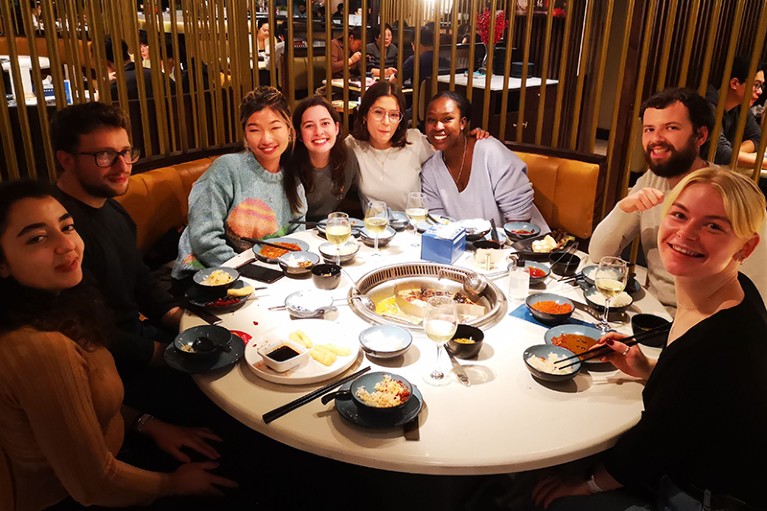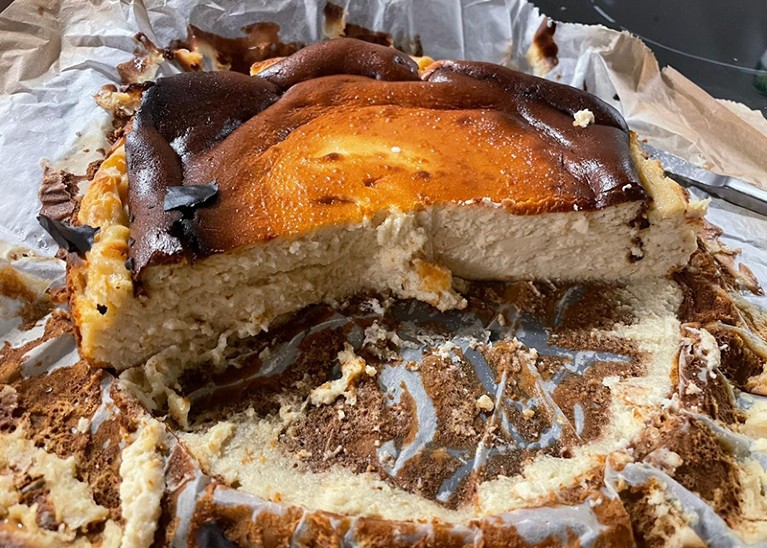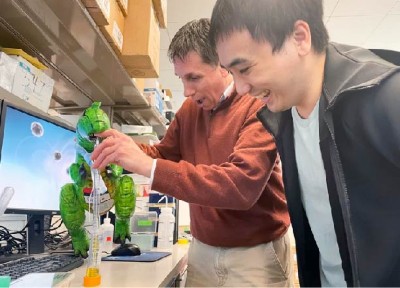
Lab members in John Tregoning’s group share dinner to celebrate the year’s publications.Credit: John Tregoning
A small wad of cash sits in a glass beaker labelled ‘motivation’, in a safe inside John Tregoning’s office. A vaccine immunologist at Imperial College London, Tregoning sticks some money in the beaker every time someone in his laboratory has a paper published. If the group publishes ten papers in one year, he doubles the cash. The proceeds fund a team dinner at the end of the year. “I quite like the cash as a physical reminder of the motivation,” he says.
Tregoning’s team varies from five to ten members. With such a small group, he stresses the need for teammates to support each other, and for senior staff to lead by example. “There’s a family dynamic to it — not in a paternalistic way, but it’s supportive,” he says. “And when it works, it’s about support and growth — and some of that is praise and reward.”
Many workplaces have parties or team meals to celebrate the end of the working year, but some show true appreciation by cultivating group traditions. Nature asked group leaders to explain these, and how they thank colleagues for their hard work.
Fun and games
What is your boss’s cat’s name? This question was one of several in-jokes in a year-end quiz run by geochemist Robyn Pickering (the reason was “because my cat, Copper, had interrupted every Zoom meeting we had during the pandemic”, she says). Pickering and her team of around ten at the University of Cape Town in South Africa have been doing an annual quiz since 2021, with each person submitting five questions. “Then you end up with something like 50 questions,” she says, ranging “from specific, like, ‘What year was this paper published?’, to silly things.”
Say what? The principal investigators who pass down wisdom through humour
Her university’s academic year follows the calendar year (as is the case for some institutions in the Southern Hemisphere), so December is a time to celebrate the end of both years. “Everything completely winds down,” says Pickering. Her team has a party “to celebrate the successes of the group, to reflect on what went well, and to make plans in a kind of relaxed way for the following year”.
Pickering hosts an afternoon barbecue party at her home. It’s family-friendly and the team can enjoy the sunny weather — which isn’t to say the atmosphere is totally relaxed. “The quiz gets really competitive,” she laughs. “Everyone takes it super seriously. And, in general, we all do shockingly badly — lots of scores below 50%.”
Postdoctoral palaeoecologist Tsilavo Razafimanantsoa has worked in Pickering’s lab since March 2023, and came to the quiz as “the new guy”, he says. His PhD research in South Africa and master’s and undergraduate studies in Madagascar didn’t have such end-of-year traditions, and he appreciates the barbecue party. “I think it’s a good way to get to know your colleagues,” he says, adding that the quiz questions people submit often reveal details of their lives.
Razafimanantsoa also notes that having the party in Pickering’s home offers a personal touch. Hosting her team is “a way to show trust, and to say thank you as well”, he says.
Geochemist Benjamin Tutolo also welcomes his team into his home for dinners to show appreciation — although this can happen at any time of year.
“I have Italian ancestry, and we have long traditions of making interesting, fun recipes,” he says. “So, a party that we’ll do is that everyone brings their own filling for raviolis, and then the Tutolo family makes the [pasta] sheets. And then we make a ton of raviolis, it’s super fun.”

Sharing sweet treats is one way many lab leaders show gratitude to their team members.Credit: Ernesto Rafael Osorio Blanco
Tutolo manages a group of 10–15 graduate students, postdocs and undergraduates at the University of Calgary in Canada. His team’s end-of-year tradition is to anonymously rank all the papers that the members have read at their weekly meetings that year. Doing it anonymously means that the more junior members can participate without worrying about what senior colleagues think, he says.
When ranking the papers, Tutolo says, they use categories such as “Why was this published in (insert prestigious journal name here) again?”, and “Most thought-provoking”. He enjoys seeing what people liked reading, as well as “the ones that turn out to be ragged on by everyone”.
The most important element of team bonding, Tutolo says, is to show that the principal investigator likes to have fun, too. “Just because you’ve risen to some level of respect doesn’t mean that you’re still not a grad student at heart. And I think that gets lost.”


